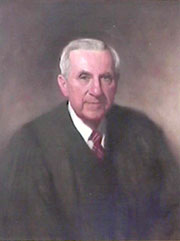New Criminal Law Blogs
Criminal law aficionados might want to check out two new blogs with Marquette connections. First, U.S. Court of Appeals for the Seventh Circuit Updates tracks new decisions by the Seventh Circuit in criminal cases. The authors are Amelia Bizzaro ’03, Tony Cotton ’05, Chris Donovan ’05, Josh Uller ’05, and your truly.
Second, Cybercrime Review explores “new technology, recent legal developments, and interesting arguments at the intersection of computers and the law.” The authors are a current Marquette student, Justin Webb, and Jeffrey Brown, a student at the University of Mississippi School of Law. In addition to being law students, both Justin and Jeffrey have impressive professional credentials in the IT field. Justin’s comment on GPS tracking and the Fourth Amendment appeared in the most recent issue of the Marquette Law Review.

 Tom Shriner’s
Tom Shriner’s